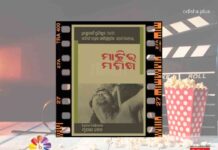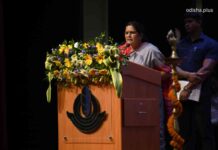By Prof. Surya Narayan Mishra

The Birth centenary of late lamented Biju Patnaik provides scope to the people of Odisha to remember an all time great son of the soil. BIju Babu was born on 5th March, 1916 and his mortal remains were consigned to flame at Swargadwar after his mournful demise on 17th April, 1997.
Some people are born great, few are made great and couple of others achieve greatness. Biju Babu belonged to the last category. As a dynamic and adventurist youth who could venture to reach Peshwar by cycle when he was only 16 and could dare to attack the police officer who prevent him to get a glance of Gandhi when later visited the State in 1927.
He studied in Ravenshaw College and science was his choice stream but his ambition was to see the world from above the sky. To fulfill this desire he took admission in Aeronautical Training Institute in New Delhi. After completion of the course he joined the Imperial Royal Air Force as a pilot. Though it was a turning point in his life yet it was not his destination of life.

Freedom Struggle In India and Biju:
He belonged to a freedom fighter family. He was influenced by the spirited words of Netaji, whose child days were spent at Cuttack and humble words of Gandhi. The second world war created conflict between colonial authorities and freedom fighters. Gandhi launched his Quit India Movement. Leaders were arrested. Biju could not isolate himself from the incidents despite being an employee of Imperial Air Force. He could meet the underground leaders like JP, Lohia, Patwardram, Aruna Asaf Ali and shared information at a great risk. On detection, he was arrested and kept under detention in Red Fort for two years from 1943. This gave a push to his nationalist credentials when he met other freedom fighters fighting for a common cause. His association with Congress leaders and particularly with Gandhi, Nehru and other prominent leaders dragged him into active politics. For this Dr H.K. Mahtab also had some encouraging influence upon him. He was elected to Odisha Legislature in 1946 from Cuttack which thus created a long 50 year sojourn to the domain of people’s representative.
 His Role In Indonesia Freedom struggle, ETC:
His Role In Indonesia Freedom struggle, ETC:
India took a visible initiative against colonization. By 1946 it was clear that the colonial days in India are now numbered. Indonesia was then under Dutch control. Under Indian inspiration a freedom movement was initiated there against Dutch harassment. He played a rare dare devil role in connecting leaders of the islands and airlifted Sultan Sjahrir in a Dakota flight to Delhi for discussion. The Indonesian freedom records the valor of this proud Indian and in fact decorated him as ‘Bhumiputra’.
During the trouble in Kashmir after independence to capture it by sending veiled troupes, Patnaik was first to airlift soldiers to save Srinagar and Kashmir which we see now. Before Kashmir fell and Harisingh, the Maharaja, taken prisoner, the king seeing Indian support agreed to sign the ‘Instrument of Accession’. Further, Patnaik also contributed in his own style during problems in Nepal and Soviet Union as well.

As Industrialist:
He possessed the physique of an athlete(He was sports champion of Ravenshaw College for consecutive years), brain of an engineer and skills of a technocrat. At the same time his heart was crying to see his home-state underdeveloped and people reel under poverty. The Industrial Policy Resolution of 1948 and the ‘Mixed Economy’ approach of Pandit Nehru accelerated his character to do something for development of economy, employment generation and also to make money which he can utilize in his political activities. Thus, couple of innovative industries was born out of his technocratic brain. He was unhappy to see the untapped mineral resources of the state and lack of entrepreneurial skills among the men of means. His initiatives caused some amount of confidence among them. Kalinga Iron and Steel at Barbil, coupleof industries at Chowdwar having airstrip, water and road connectivity at doorstep could be put on action. He knew what were the minimum infrastructure for floating industry. Chowdwar Industrial Complex was a trend setter.

Later, he was associated in many such ventures not as investor but as decision maker. The end products were – Balimela Power Project, Paradeep Port, Thermal industries in Talcher and to cope with science and technology education in the state. He was an industrialist with a difference. All these character look at profit making including him. But he was man of the masses. Fire was a challenge to straw made homes in villages with contiguous settings. He thought of fire proof tile at a low cost for the immediate action against fire problems.
He also knew that Odisha is mineral rich, the hinterland of the villages have agro-industrial potential but the governmental initiative was lacking. Those were the days of democratic decentralization. He identified the middle tier (Panchayat Samiti) as the initiation point of participatory development of rural Odisha. He gave the concept of Panchayat industry based on local resources. From political decentralization, Patnaik conceived the idea of economic decentralization. He was not in favour of high profile long waiting heavy industries. He thought they can be like islands but there should be ocean of industries in the village zone creating spiraling effect of market, communication, technical schools and direct attack upon poverty by increasing employment potential.
He looked for developed Odisha through more power generation, better irrigation facilities and flood free as well. The proposed Tikarpada Dam, ‘The Decade of Destiny’ concept linking the rivers and to give Odisha Bauxite a world reputation NALCO could emerge from a brilliant brain.

Promotion of Education, Science and Technology:
Biju’s agenda was written in a different ink. He not only wished to see the State developed both agriculturally and industrially and his dream is to be fulfilled by the odias who pass out of institutions of national importance. The very idea of getting Sainik School allotment for the State was to develop smart, physically sound confident young talents who will branch out to engineering, medicine, management and other streams. The establishment of Regional College of Education at Bhubaneswar, Regional Engineering College at Rourkela, Regional Research Laboratory at Bhubaneswar and providing proper leadership to O.U.A.T were the instances. To attract students for better and committed learning a number of scholarships were also given. The proud moment came at an early age when he instituted Kalinga Prize under UNESCO for the popularization of science. These laudable vision and action made him unparallel among his contemporaries.

Demanding Fair Deal For Odisha:
When he entered into third floor of the secretariat in 1990 after a gap of 27 years, he was crest fallen to watch the plight of the State. In the National Development council which was convered to approve the Eighth Plan papers with V.P Singh as the Prime Minister, Biju Babu observed that “The challenge before us is to break out of the vicious circle of low productivity, unemployment and poverty. Our primary emphasis should be on increased efficiency and productivity in all sectors of development. Economic groth shold be seen not merely in terms of a ‘rate’, the emphasis should rather be on the content of development than on a ‘growth rate’. Growth has to be combined with equity, a reasonable minimum standard of living and provision of essential social amenities to everyone as speedily as possible. It should ensure special attention to the needs of the disadvantaged and vulnerable sections of the society and at the same time ensure more rational and wide spread diffusion of the fruits of development in a balanced manner among the regions”. He pleaded before the council that plans should be formulated so that my State (Odisha)’s Bolangir and Kalahandi can become ‘zero unemployment districts’.
Pleaded For Fiscal Federalism:
His heart was crying to see the plight of the people of the State. He emphatically demanded a fresh look at Union-State financial relationship. He mentioned- “The relative backwardness of Odisha as compared to other states both in regard to extent of poverty and its intensity are reflected in the available data. In fact, the intensity of poverty is much higher in Odisha than in many other states. This calls for appropriate remedial measures particularly in regard to the devolution of financial resources between the centre and the states. I would suggest that the existing ‘Gadgil Formula’ might be supplemented by a composite index of backwardness, appropriately devised, which might benefit relatively backward and poverty stricken states like Odisha”. In that NDC meeting Biju was unhappy with the allocation formula and his love for the state provoked him for more devolution of funds to the suffering states.

Emphasis On Decentralization And Empowerment:
He was unhappy to see his state suffering due to lack of investment in social sector and centralized poverty eradication programmes. During his second term he pleaded for a decentralized polity and planning. While respecting the attitude of centre implementation of socio-economic programmes for development by the elected representatives of local institutions to expand employment, production and income in various economic activities, he was of firm opinion that employment generated must be productive and relevant. He acknowledged ‘Right to Work’ for job seekers but at the same time emphasized on asset building and productive use of time by those who are already employed. Power to the people sould be in reality not as a charity, he always emphasized.
Decentralized planning, to him, is much needed at the village level, both in terms of formulation and implementation. It is necessary to utilize the latent energy of our people in the plan efforts and in plugging the loopholes. He pleaded for a clean and impartial system of administration at the grass root level. He laid stress by saying- ‘In the absence of these inputs, a combination of other resources- men, material and capital – will fail to achieve the desired objectives.
Both confidence building and capacity building were in his agenda always. As chairman of Austerity Commission he made a lot of observations as a nationalist who understood the needs and also knew ow to apply norms. These were for empowering people and making the socio-economic-political system people friendly.

A Statesman among Politicians:
Viswakabi Rabindra Nath Tagore once said – “It is easy to drive people, but what is hard is to lead them”. Biju had understood and realized the lines and also between the lines. In a representative democracy, politicians would come and would go, but few of them can be credited as statesmen. Politicians think about the next election and hence become populist. But statesmen think about the next generation and leave behind them memories of their love, sympathy and contributions. A populist politician is always forgotten but a popular statesman will be remembered for decades. Late lamented Biju Patnaik was a ‘Legendary Hero’ and a true ‘Son of The Soil’. Richness and affluence never made him arrogant. He remained as a people’s leader and ever cherished by his followers, contemporaries and admirers as well.
This is the ‘True Tribute to the Leader of the Masses and for the Masses’.
Courtesy: www.bijupatnaik.org

























